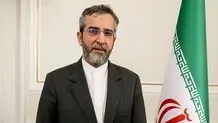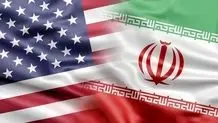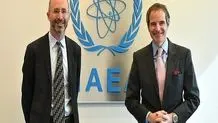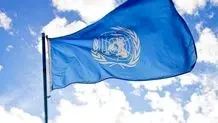Iran VP holds meetings on sidelines of UN session in NY
Iran’s Vice President for Women and Family Affairs Ensieh Khazali has held meetings with officials from different countries on the sidelines of the United Nations Commission on the Status of Women in New York.
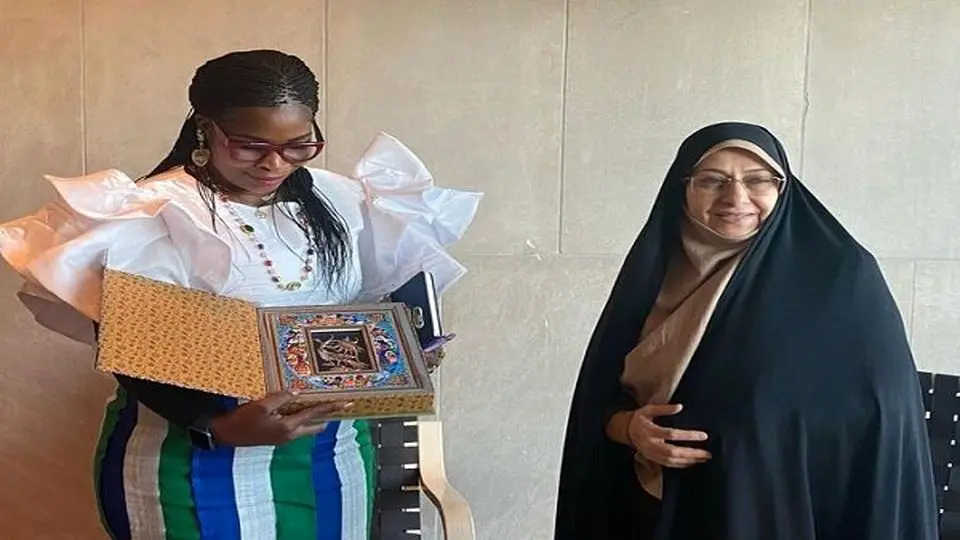
MEHR: Iran’s Vice President for Women and Family Affairs Ensieh Khazali has held meetings with officials from different countries on the sidelines of the United Nations Commission on the Status of Women in New York.
In a meeting with Sierra Leone's Minister of Gender and Children's Affairs Isata Mahoi, Khazali touched upon some of Iran's achievements regarding the issue of women and family.
She expressed hope that the relations between Iran and Sierra Leone would expand, especially in the economic field.
Referring to the ongoing Israeli war in the Gaza Strip and the siege imposed by the Tel Aviv regime on the coastal sliver, the Iranian vice president said, "Ramadan is a month to take care of the needy and as you know the situation in Gaza is very difficult and we have a responsibility to fight the issue of hunger in Gaza... We hope that all countries will unite to take action against the Zionist regime."
Mahoi, for her part, said that her country is willing to use Iran's experiences in fighting against corruption.
She also expressed hope that the relations between her country and Iran would further expand.
Khazali also met and held talks with Mahinur Özdemir Göktaş, the Minister of Family and Social Services of Turkey, in New York.
We have a duty to take serious action regarding the women of Gaza, and I hope that the countries, especially the Islamic countries, will put an end to the difficult conditions of the people of Gaza in a coordinated action, the Iranian official said.
The Turkish minister, for her part, said that Tehran and Ankara have deep historical and cultural ties. She also thanked the Islamic Republic of Iran for its unwavering support when Turkey was hit by the earthquake.
Considering the threats and challenges in the region, strengthening relations between countries is very important, she added, adding, "Gaza and Palestine are sacred to us; We stood by them years ago and we stand by them now."
Iran’s Vice President for Women and Family Affairs and Saudi Arabia's Secretary General of the Family Affairs Council Maymouna Bint Khalil Al Khalil also held a meeting on the sidelines of the UN session in New York.
During the meeting, the two sides discussed a range of issues related to the women and family.
They also stressed the need for developing the relations between the two countries in this regard.
In a meeting with Maryam bint Ali bin Nasser Al Misnad, the Qatari Minister of Social Development and Family, Khazali hailed the positions of the Qatari government in supporting the oppressed people of Gaza.
She expressed hope that with the extensive cooperation of Muslim countries, an immediate ceasefire will be established in Gaza and the possibility of people's access to humanitarian aid will be provided.
The Qatari minister, for her part, expressed hope that a stable and extensive cooperation in issues related to women and family will be established between Tehran and Doha.
Ensiyeh Khazali also held a meeting with Finland’s Minister of Social Security Sanni Grahn-Laasonen in New York.
Khazali and Grahn-Laasonen exchanged views on a number of women-related issues in their respective countries while they sat down face-to-face on the sidelines of the United Nations Commission on the Status of Women on Tuesday night.
In the shadow of the existing security system in Iran, women with Hijab have been excelling with complete safety in various social, sports, cultural, artistic and scientific arenas, which are confirmed by official statistics and documents, Khazali said.
She also stressed the need for respecting cultural diversity in all countries, saying the approach of some Western nations toward violence against women is punitive and curative, while Iran’s approach toward this issue is preventive, and the statistics of international organizations seem to confirm the success of the Islamic Republic in this regard.
The Islamic Republic also believes in promoting "gender justice" with the aim of improving the status of women and families. But we believe in gender justice that goes beyond gender equality which is not sufficient, fair and a guarantee of women’s comfort and benefits considering their characteristics and conditions, she emphasized, adding that Iran has been providing special concessions in the form of laws to women, especially pregnant and nursing mothers with the aim of women’s development and progress as well as improving their status in families.
"In Iran, as per laws, women are not obliged to provide for the family and this is considered to be the duty of men," Khazali further said.
Grahn-Laasonen, for her part, also highlighted her country’s approach toward women as well as initiatives taken by respective governments in this regard in Finland.
The development of women's progress and improvement of human rights is considered a serious matter in the welfare state of Finland, she said, adding that “ensuring gender equality for women is the center of all government programs”.
آخرین اخبار Iran را از طریق این لینک پیگیری کنید.

